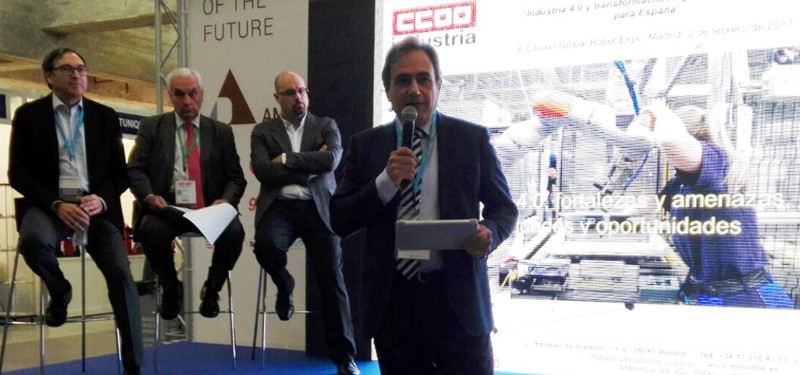Industry 4.0 and Digital Transformation, a new model for Spain

The CEO of GMV Secure e-Solutions, Luis Fernando Álvarez-Gascón, acting as President of the Innovation Area of AMETIC and Vice President of the R&D committee of CEOE, moderated the panel discussion “Industry 4.0 and Digital Transformation, a new model for Spain” in the Global Robot Expo. Other participants were Verónica Pascual, President of AMETIC’s Industry 4.0 Committee; Máximo Blanco, Secretary of Industrial Strategies of the Spanish trade union CC.OO. and José Varela, Technical Cabinet, Communication Sector of the trade union UGT.
As the executive explained in his presentation, the concept of Industry 4.0, coined in Germany to designate an industry applying technological breakthroughs like big data, the Internet of Things, robotics, 3D printing, artificial intelligence, drones and augmented reality, “is here to stay and we ignore it at our peril”.
There is still some unfinished business in Spain. Joint work is needed to drive social dialogue between trade unions, employers’ associations, industry and the government in order to agree on measures to develop Industry 4.0 and the new Digital Economy. This relies on governments bringing in the proper enabling policies. In this context Álvarez-Gascón stressed AMETIC’s work in its Industry 4.0 Committees to ensure that the “Factory of the Future” is widespread throughout Spain’s whole industrial fabric. The general consensus was that this was “essential, unstoppable and urgent” for Spain.
Despite the widespread fear of the new model threatening jobs, the participants in the debate argued that new working opportunities would in fact be opened up. Jobs like data scientist or cobot programmer, alongside plant workers on the floor, will help to boost productivity and carry out life-endangering jobs, replacing other jobs of less added value.
Of all the policies that might contribute towards the industry’s digital transformation we should not forget educational policies, capable of spanning the labor digital divide with an across-the-board National Technology Inclusion Plan.